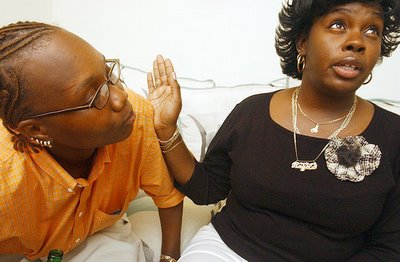

 In the work I have done advocating for the right of same-sex couples to marry, often I feel pitted between younger Latino LGBT community members for whom marriage remains an abstract idea that is not relevant to their daily lives; and LGBT activists, most of whom do work in communities of color, who feel that the push to embrace marriage comes at the cost of eclipsing other more "pressing needs" (then again, some would actually rather see marriage, which they see as an oppressive institution, fully disappear).
In the work I have done advocating for the right of same-sex couples to marry, often I feel pitted between younger Latino LGBT community members for whom marriage remains an abstract idea that is not relevant to their daily lives; and LGBT activists, most of whom do work in communities of color, who feel that the push to embrace marriage comes at the cost of eclipsing other more "pressing needs" (then again, some would actually rather see marriage, which they see as an oppressive institution, fully disappear).When I am asked why the issue of marriage for same-sex couples should be a priority for the Latino LGBT community, the question often comes from someone who is opposed to the issue and is trying to make a rhetorical point. And yet, the insistence on asking the "priority" question often puzzles me as I'm not sure that some of us who do advocate for the right to marry think that it's the "only" work that we do or our number one goal (I often respond that we are all able to advocate for a myriad of issues, not just the right to marry, and that I find it funny that I am not asked the "priority" question when it comes to my work on other areas which I do prioritize, such as immigration).
More difficult is to respond to criticism that marriage would benefit mostly well-to-do white gay couples and do little to benefit less well-off gay couples of color, mostly because - until recently - we have had to go by gut instinct rather than facts (as research has been sporadic and limited).
This is why an article such as "From Pain to Family: Seeking stability amid the chaos, more poor women of color are turning to each other" (Hartford Courant, April 30, 2006) is such a breath of fresh-air.
Over a period of a year, reporters Tina A. Brown and Elizabeth Hamilton followed the lives of seven poor African-American and Hispanic female couples in the Hartford, Connecticut area, and they describe the harsh life these women lead as they try to sustain their relationships and their ties to other family members including children.
Though committed relationships can fail whether they are between heterosexual or homosexual couples, it is clear to me that these women are being hurt by the fact that they are not allowed to marry. They are being denied the right to cement the family bonds they are struggling to sustain; they are being denied the right to strengthen the legal and economic protections they would enjoy as married couples and parents; and, most importantly, they are being denied the right to celebrate their love for each other in such a meaningful way.
It is an amazing article and I hope you take a couple of minutes to read it. Afterwards, feel free to write a "Letter to the Editors" of the Hartford Courant congratulating them on the piece by sending it to: letters@ courant.com
As for recent research on minority same-sex couples in the United States and the true impact of denying them the right to marry, you can go to:
- "Race and Ethnicity of Same-Sex Couples in California" (UCLA School of Law, Feb. 2006)
- "Hispanic and Latino Same-Sex Households in the United States: A Report from the 2000 Census" (NGLTF, Nov. 1, 2005)
- "Black Same-Sex Households in the United States: A Report from the 2000 Census" (NGLTF, Oct. 5, 2004)















No comments:
Post a Comment